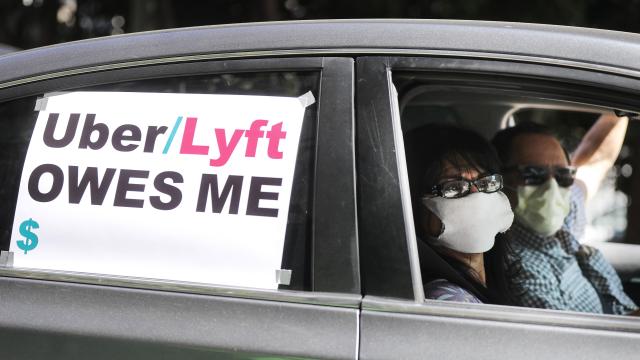Uber may have built its hailing empire, in part, by notoriously skirting past local laws and regulations, but at least one state’s finally forcing the company to pay up.
On Tuesday, Uber agreed to pay New Jersey $US100 million (around $150 million in Aussie terms) in back taxes over claims the company misclassified thousands of drivers as independent contractors between 2014-2018. That mischaracterisation, according to an audit conducted by the New Jersey Department of Labour and Workforce Development, may have prevented thousands of workers from being able to receive critical resources like unemployment, disability and family leave insurance. Though narrowly focused on New Jersey workers, the payout potentially marks an inflection point for drivers across the country who’ve, for years, refuted Uber’s labelling of them as so-called “gig workers.”
“We will not tolerate companies that misclassify their workers, thereby denying employees vital benefits and dodging their obligation to contribute to programs that benefit the workforce,” New Jersey Acting Attorney General Matthew Platkin said in a statement. “By misclassifying workers, companies both harm their employees and sidestep their obligations under the law. New Jersey will continue to enforce our employee misclassification laws aggressively to prevent such conduct. As the economy changes, we will vigorously defend workers’ rights.”
The $US100 ($139) million fine reportedly represents the largest of its kind ever recorded in New Jersey but it could have actually been much larger. The original Department of Labour audit sought over $US1 billion worth of back taxes when it first fined the company in 2019 according to documents sent to Gizmodo by Uber. In total, the agency originally claimed Uber and Raiser (an Uber subsidiary) owed $US522 ($725) million and $US528 ($733) million, respectively. In hindsight, the Department of Labour says those figures were “rough estimates based on incomplete data.” Uber ultimately agreed to pay $US12.1 ($17) million while Raiser paid $US88 ($122) million.
Despite agreeing to the fine, Uber said it did not amount to a settlement. Uber’s also sticking to its guns on the gig work classification lingo.
“Drivers in New Jersey and nationally are independent contractors who work when and where they want — an overwhelming amount do this kind of work because they value flexibility,” Uber said in a statement sent to Gizmodo. “We look forward to working with policymakers to deliver benefits while preserving the flexibility drivers want.”
Robert Asaro-Angelo, New Jersey’s Labour Commissioner, forcefully disagreed with that position in a statement.
“Let’s be clear: there is no reason temporary, or on-demand workers who work flexible hours, or even minutes at a time can’t be treated like other employees in New Jersey or any other state,” Asaro-Angelo said. “We will not bow to the whims of corporations’ latest business models that are based on eroding long-standing protections.”
New Jersey’s historic fine comes as other states around the country grapple with legislation aimed at combating, or in some cases, facilitating, the gig work economy. In 2020, California narrowly passed a controversial gig-company-backed ballot initiative called Proposition 22 which sought to roll back labour laws requiring companies like Uber to classify workers as employees. Uber, Lyft, Doordash and similar companies created the initiative and reportedly spent more than $US200 ($278) million to push forward the measure. Luckily for the state’s gig workers, a California judge struck down the proposal last year on constitutional grounds.
Unconstitutional or not, that hasn’t stopped other states from attempting to create their own legislation modelled after Prop 22 though so far, those have yet to truly materialise. Earlier this year, gig work companies reportedly spent $US17.8 ($25) million to pass a ballot initiative in Massachusetts which would have formally classified gig workers as independent contractors instead of employees. That initiative fell flat after the state’s Supreme Court ruled the proposal unconstitutional, due in part to its “vaguely worded provisions.” In other states like New York, however, gig work companies are taking a sneakier approach and are reportedly negotiating with major labour unions to let workers organise for certain issues like minimum pay, but under the formal classification of independent contractors.
Now, with Uber licking its wounds in New Jersey, the state ecosystem once deemed ripe for gig company interference suddenly seems less vulnerable. Other states less sympathetic to gig work’s underlying business model could potentially follow New Jersey’s lead, which would create a massive headache for dozens of companies relying on mischaracterized labour. More critically, aggressive regulatory actions from states could put some money and resources back into the pockets of gig workers. Around 16% of U.S. adults surveyed by Pew Research last year said they earned money through some type of gig platform.
